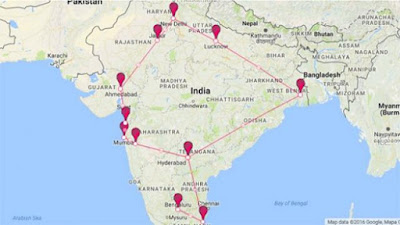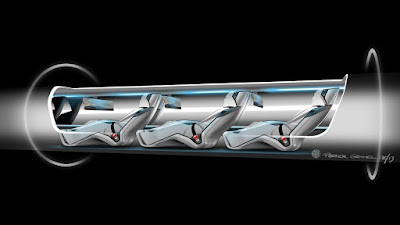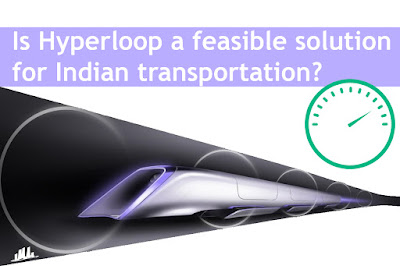Is Hyperloop a feasible solution for Indian transportation?
If someone whom you just met says that he stays in Bangalore and working in mumbai, then it may not be a surprise once Hyperloop technology takes its shape in India. Hyperloop is a transportation technology in which the pods are transported through controlled pressure tubes. It was first grabbed the attention when Elon Musk, the CEO of Tesla, presented this concept back in 2013.
The speed of this Hyperloop is greater than 1000 kmph which means one can have breakfast at Srinagar and then lunch at Kanyakumari. Two firms—Hyperloop One and Hyperloop Transportation Technologies Inc. (HTT)—are, and both are keen to introduce the Hyperloop in India. Hyperloop One is looking at five corridors: Delhi-Mumbai, Bangalore-Thiruvananthapuram, Chennai-Bangalore, Mumbai-Chennai and a port connector project.
"We are in the process of raising hundreds of millions of dollars in our series C funding. We are also talking to Indian investors," said Nick Earle, senior vice president (global field operations) at Hyperloop One. "The largest number of entries (companies, institutions interested in technology) for our global challenge is from India. We have also planned meetings with government bodies in India and will provide all possible help in framing regulatory norms for this new technology."
All these news seems like Indian transportation is going to undergo a rapid swift, but when all the constraints are taken into account, it is skeptical to say that Hyperloop is a feasible solution for India.
 |
| A countrywide network proposed by Hyperloop One. Image: Daftlogic |
"Hyperloop One Global Challenge" is the competition announced by HyperloopOne which received 2600 participants. Among the finalists there are 5 Indian teams. HyperloopOne organized a "Vision for India" showcase event on February 28th where all the five teams presented their plans. Also present were Ministers and dignitaries from Ministry of Transport, Railways, and NITI-Aayog. Clearly, a dog and pony show at their expense to potentially garner support from various parts of the country to get one of the proposed routes implemented in India.
So, what are the prospects?
The major problems faced by the major projects in India are Land Acquisition, Delays of the project, Funding and Budget allocations, Public-private partnerships, etc., Now, that doesn't mean we should never invest in a large project, but the alternative is to look for ways to improve transportation using existing means like track upgradations, switching to Talgo coaches to improve average running speeds, or improving station facilities without having the need to go into land acquisition complexities.
Speed:
Although there are claims of safety and cost, I am yet to see compelling arguments for why Hyperloop is safer in India compared to train travel (given a large majority of Indian terrain is earthquake prone), or why it would be cheaper. So the single biggest selling point now is speed.
Instead of boiling the ocean with projects like Hyperloop, I believe that Indian Railways should accelerate projects that allow us to improve our average speeds from the current 50~60kmph to a reasonable 100~150kmph. The Talgo coach project is an example, using coaches from the Spanish manufacturer will allow us to improve average running speeds in all major routes and express trains like the Shatabdi.
 |
| Hyperloop passenger capsule version cutaway with passengers onboard. Image: SpaceX |
Safety:
There are 6000+ unmanned crossings in India. Railways plan to do away with them all over the next three years, and that is going to cost them a whopping 7500 crores, of which 3600 crores is not funded! In comparison, HTT is demanding an investment of 6500 crores to move passengers from Mumbai to Pune in 25 minutes. I'd any day use the 6500 crores and save lives of the multiple people and livestock that die every year in unmanned crossings than get into another multi-year construction project that moves people in 25 minutes between Mumbai and Pune, or any other city pair.
The United States transported 900 Million passengers in their domestic flights in 2015, that is almost a tenth the size in comparison to the 8.6 Billion passengers traveling by Indian Railways each year. Yet, the USA has had a National Transportation Safety Board in existence since 1938. Indian Railways in spite of the number of accidents and lost lives hasn't had a separate board that investigate accidents, identify root causes, or draft prevention plans. Only in the 2017-20 plan do the Railways get serious about allocating funds for an independent Rail Safety Board.
In the 2017-20 plan, Railways have outlined that over 5100Kms of tracks are overdue for maintenance/change and there exists a backlog. Note that these overdue tracks are the cause of accidents and derailments most often. If only we had funds to accelerate the removal/perform maintenance of overdue tracks, we can avoid the accidents that happen every few months.
These are only a few points as examples to outline what the Railways should accelerate execution on, as opposed to moonshot projects like Hyperloop. There is plenty more that I have to pick with the Railways, and I'll save that for another post lest I distract the audience away from the main point.
Hyperloop is a disruptive technology, it is a product of some very smart brains that have figured a way to transport people, and potentially cargo between long distances at near-supersonic speeds. There's a lot of momentum around this concept and some very smart Indian engineers haven latched on to this fast moving train, to try and bring this technology home.
What is to be seen is the articulation of a sustainable economic model for how this mode of transport could prove not only faster, but everything else it claims to be: safer, energy efficient, and scalable. All that without causing the Government additional headache of managing yet another multi-year land acquiring construction project, and a tiff with the states on decision making.
In the absence of such, viable alternatives like improving safety, and average speeds of Indian trains is common sense in the long term.
Sources: https://www.linkedin.com/in/nirupesh


0 Response to "Is Hyperloop a feasible solution for Indian transportation?"
Post a Comment